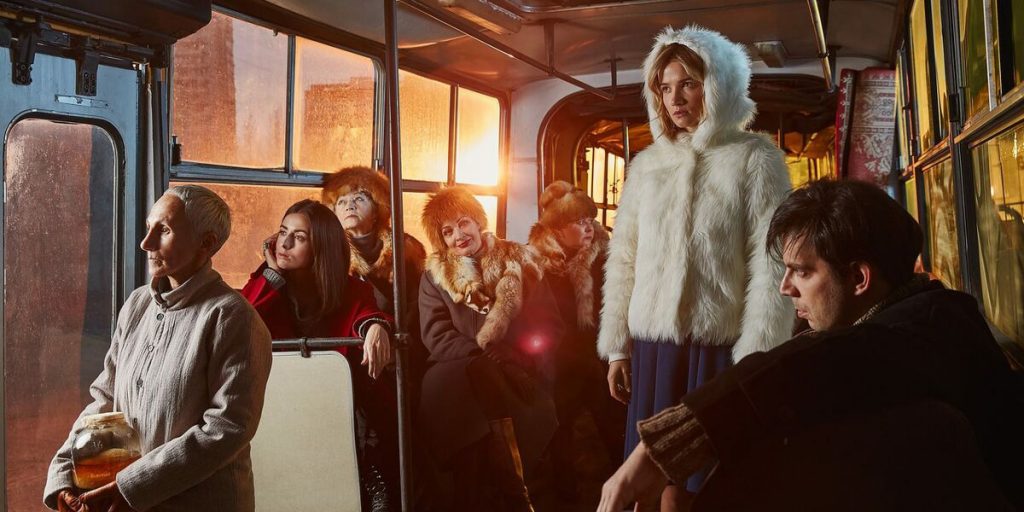Dystopian sci-fi Petrov’s Flu is an intriguing but cluttered mixture of thoughts and musings on Russian society, which makes for a fresh but sometimes frustrating watch.
As the film’s title suggests, Petrov has the flu; that much is easy to grasp. But the simplicity of the title is unmatched by the film itself, which is a near two-and-a-half-hour piece of work which revels in the absurd, constantly challenging the audience with unconventional storytelling and by shifting between past and present, fantasy and reality. Just when you think you’re on board with Petrov’s Flu’s deranged structure, director Kirill Serebrennikov (The Student, Leto) will hit you with another doozy, forcing your brain to rewire and start thinking all over again. It’s a commendable tactic, but Serebrennikov’s sheer fierceness to push things not just to the limit but far past it means Petrov’s Flu can be all too frequently perplexing. The worlds of the living and the dead collide, dreams become reality (and vice versa), and we as the audience are none the wiser by its conclusion.
Based on Alexey Salnikov’s equally unusual novel “The Petrovs In and Around the Flu”, the film begins with Petrov – played by a largely subdued Semyon Serzin (Side Effect) – on a bus in the post-Soviet city of Yekaterinburg, coughing through his illness and surrounded by oddball strangers. An old man gets on, verbally abuses a young child, and is promptly assaulted and thrown off. Petrov himself is then involved as a rifleman in a firing squad shooting members of the upper-class. It’s a bizarre, mesmerising and downright fascinating opening, marking out a hope for this exciting madness to continue. From here, we meet Petrov’s estranged wife Nurlinsa – brought to life by the absorbing star-of-the-show Chulpan Khamatova (Good Bye Lenin!, The White Crow) – young son, and Igor, a dodgy man who can mix the worlds of the living and the dead. The sequences that follow – both in reality and dreams – are difficult to comprehend in their onslaught and have varying degrees of interest to them.
Serebrennikov commendably never offers easy answers to proceedings: in Petrov’s Flu, the more confused you are, the more the director seems to revel in it. The film is an invitation to think on society in the past, present and the future. It makes for a thought-provoking, challenging aftermath as you reflect on what you’ve seen, but it also means Petrov’s Flu is not a film of great enjoyability whilst watching it due to its confusing, scattered structure. There are undoubted highlights though: a memory from Petrov’s childhood involving a snow maiden at a Christmas party is told from two different perspectives and is tinged with a mournful nostalgia which seeps into the present day. Other dream-based sections see Petrov meet with someone struggling to get a book deal, or a man contemplating suicide and asking for Petrov’s assistance. There are real treats in Petrov’s Flu amongst its deluge of characters and scenes, but there are just as many weaker ones too, and as a whole they rarely connect or play off one another.
In a technical sense, Petrov’s Flu is marvellous. Vladislav Opelyants’ brave cinematography and Yuriy Karikh’s expert editing impressively straddle the two worlds of dreams and realities, with seamless transitions between every story and scene. This free-flowing feel is reminiscent – and often just as impressive – as that of Birdman (2015). Opelyant also uses unique camera angles to lend Petrov’s Flu its unmistakable sci-fi tone. Impressive visual effects and ethereal lighting amplify this otherworldly on-screen dystopia: even a normal lamp looks like a spaceship in Petrov’s Flu.
And yet for all these strengths, Petrov’s Flu never coalesces into something wholly effective. It’s about a society collapsing, a pandemic ripping through its populace, but it never quite maintains that connection with the world’s current events, despite Serebrennikov’s obvious intentions to do so. Ultimately, Petrov’s Flu is like a messy scrapbook of thoughts and feelings; it’s beautiful and absorbing for large portions, but it’s messy all the same. There is an incompleteness to the film which is even more noticeable when it reaches certain impressive heights before skittering away to another loosely formed scene and idea. Petrov’s Flu is a wild, audacious ride, with its impulsiveness and rashness sure to delight some but just as likely to frustrate many more.
Petrov’s Flu will be released in UK cinemas by Sovereign Films on 11 February 2022.

